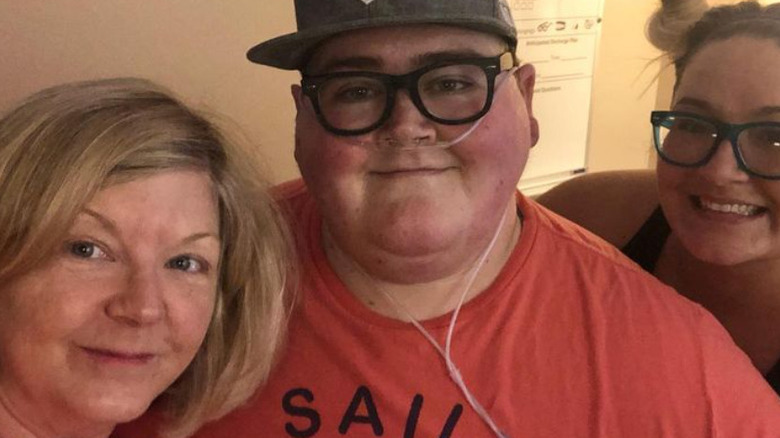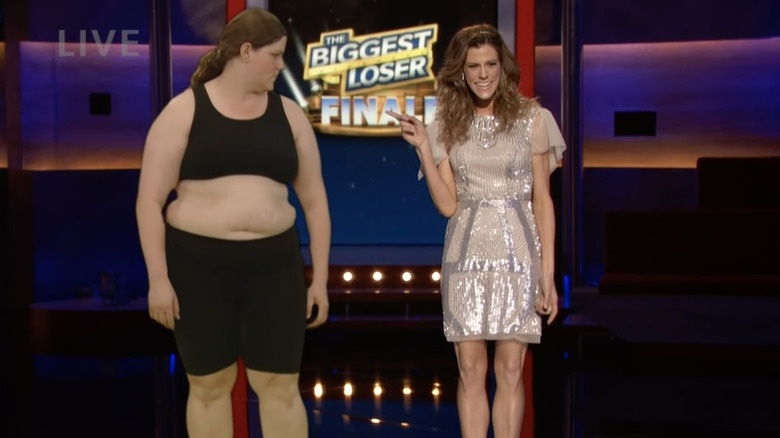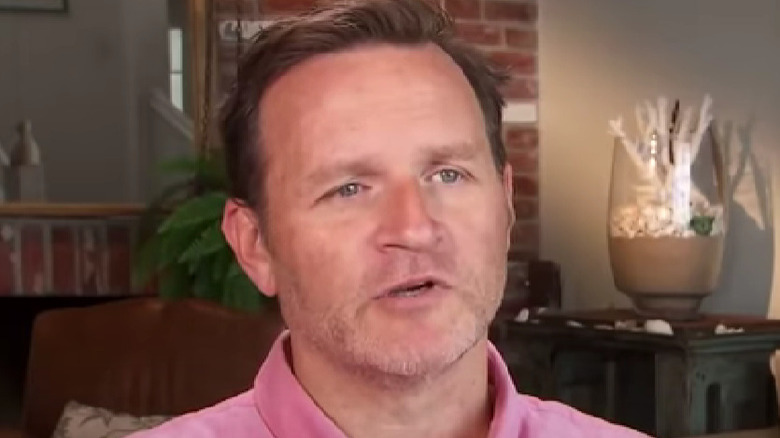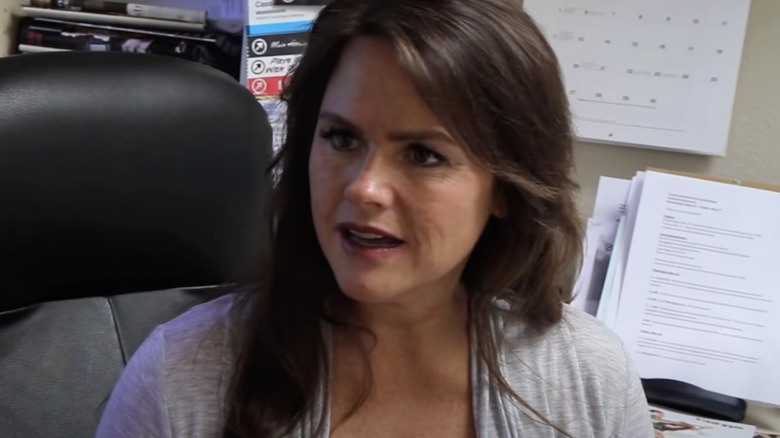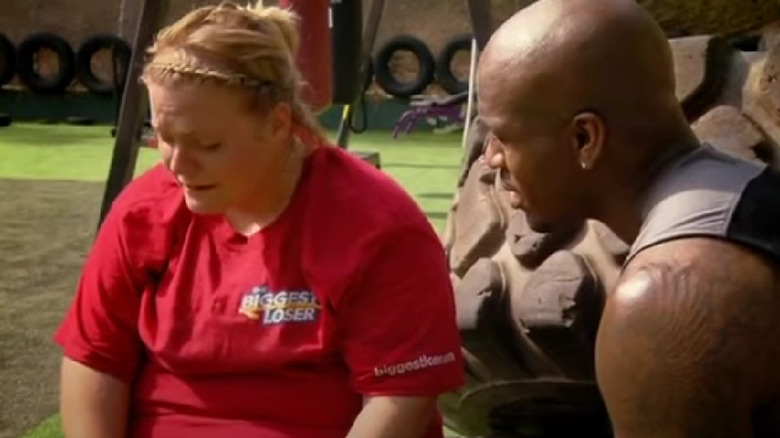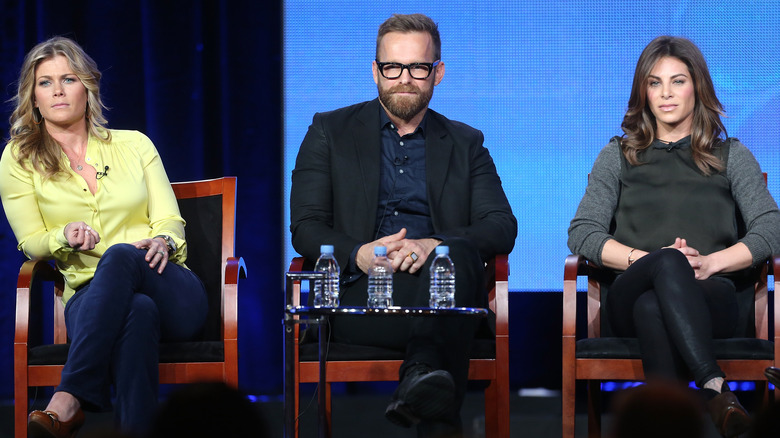The Biggest Loser Stories That Are Darker Than You'd Think
"The Biggest Loser" was a show that most people remember as a staple of early 2000s television. It features teams of contestants who are looking to lose weight with the incentive of a cash prize, guided by a team of dieticians and trainers. One of the most shocking aspects of the show was how quickly some contestants lost weight — with some losing almost 40 pounds in a single week — and the questionable and harsh behavior of the trainers, namely Jillian Michaels.
And while some people think the show is simply a "tough love" approach to weight loss, physicians and nutritionists recognize that hours-long daily workouts, demeaning trainers, and extreme calorie restriction probably isn't the best way to promote health — in fact, the show's weight loss methods are associated with adverse health risks. From contestants who passed away after the show to the hidden secrets behind the scenes, we're here to cover all "The Biggest Loser" stories that are darker than you'd think.
Former contestant Daniel Wright passed away at 30
Daniel Wright was a contestant on "The Biggest Loser" Seasons 7 and 8 in 2009. He lost a whopping 30 pounds in his first week of Season 7 and continued to shed pounds each week until he was eliminated in week four. He returned for Season 8, working hard each week and making it all the way to week 9.
After the show, Wright fell in love with Rebecca Meyer — who was another contestant on "The Biggest Loser." Though the two met on the show, they didn't immediately connect; in fact, Meyer told People the two didn't like each other initially. "We went from not liking each other to becoming friends to becoming best friends," she said. After the show, the two kept in touch, and it was clear that deeper feelings were growing. "We realized that we wanted to spend hours on the phone talking to each other. I in turn fell in love with my best friend," Meyer reflected.
Tragically, Wright passed away at just 30 years old in 2019 after a two-year battle with acute lymphoblastic leukemia (via Global News), leaving behind his heartbroken wife, friends, and family. Wright's friend and "Biggest Loser" Season 8 winner Danny Cahill posted on Facebook after Wright's passing and said: "Daniel's light has always been one of Grace, encouragement, wisdom, love and honour throughout the time I have known him. ... Yesterday the world lost a bit of its light" (via Global News).
Biggest Loser alum Damien Gurganious passed away at 38
Former Season 7 "Biggest Loser" contestant Damien Gurganious passed away at age 38 in 2014 (per Us Weekly). Gurganious experienced the sudden onset of an autoimmune disease called idiopathic thrombocytopenic purpura (ITP) which led to bleeding in his brain, according to a statement released by his wife Nicole Brewer Gurganious. After his passing, his family shared: "He was a pillar of his family, an amazing son, brother, cousin and uncle. He was an incredible husband and father to his two-year old daughter, Giselle. He was an inspiration and a mentor to so many. His love for his family and friends was immense" (via Us Weekly).
His wife, who was on "The Biggest Loser" alongside her husband, shared on her Facebook page: "All of you who knew Damien can attest to his generous and loving spirit, his outgoing and gregarious personality, and his caring and compassionate nature. Damien always desired to bring out the best in those around him by offering encouragement, support and love, often couched in his own hilarious and sage adages" (via Us Weekly).
Season 3 runner-up Kai Hibbard is 'embarrassed' to have been on the show
Kai Hibbard began her journey on "The Biggest Loser" after her best friend at the time prompted her to try out for the show. Hibbard made an audition videotape and "the next thing I know, I'm on a reality TV show," she told the New York Post.
Hibbard had never seen the show prior to being on it, so she had no idea what was in store for her. She found out quickly that it wasn't going to be a positive experience, and now she looks back on the situation with regret. "It was the biggest mistake of my life," Hibbard told The Guardian. Though she doesn't say she regrets losing the 121 pounds she shed on the show, she explains that the rules and requirements were extremely problematic. For example, right off the bat, contestants were made to work out in five- to eight-hour-long sessions which would be a long and grueling workout even for top athletes. "There was no easing into it," Hibbard told the New York Post. "That doesn't make for good TV. My feet were bleeding through my shoes for the first three weeks."
On top of the intense (and dangerous) exercise expectations, the trainers were punitive and seemed to enjoy the contestants' suffering, according to Hibbard. "The whole f––king show is a fat-shaming disaster that I'm embarrassed to have participated in," Hibbard told the New York Post.
Contestants admitted to fasting and intentionally dehydrating themselves to lose weight
One of the talking points of "The Biggest Loser" is how quickly contestants lost weight, with competitors commonly losing more than 20 pounds a week. The show justified this because of the intense exercise and dieting, but there may also be some other factors at play. Contestants have admitted to intentionally dehydrating themselves so that they weigh less. The show's alum Kai Hibbard wrote on a blog that the contestants would drink as little water as possible in the day leading up to a weigh-in, and they would also put on as many clothes as they could prior to a workout to sweat more (via The New York Times).
Season 1 winner Ryan Benson was so dehydrated and malnourished throughout the show that he was urinating blood, according to the New York Post. "That's a sign of kidney damage, if not failure," Professor of exercise science Lynn Darby told the New York Post.
In response to the intentional dehydration and rapid weight loss, the show's trainer Jillian Michaels told The New York Times: "Contestants can get a little too crazy and they can get too thin. ... It's just part of the nature of reality TV." While it may be true that reality TV goes to extremes, it's also important to acknowledge that a show that promotes weight loss above all else — including health — would put significant pressure on contestants, resulting in unsafe measures to shed the pounds.
Season 15 winner Rachel Frederickson became what some consider dangerously thin
Rachel Frederickson won Season 15 of "The Biggest Loser" after going from 260 pounds to 105 pounds, dropping a shocking total of 155 pounds, which was over half of her starting body weight. While the show celebrated Frederickson's "successful" weight loss, others were concerned about her; after all, her BMI had dropped beneath what doctors would consider a healthy weight range, according to Time.
In a YouTube clip of Frederickson's weight loss reveal, viewers see her emerging looking very thin. Trainer Jillian Michaels is seen in the video looking shocked and worried as Frederickson shows off her new figure. One YouTube commenter wrote: "At 105 she was VERY underweight. At her 5'5" her HEALTHY range is 124-144. The reason Jillian looked so concerned is that the last time they had worked with her, she was NOT That skinny. She had done some extreme exercising between the actual last workout and this finale. Afterwards, she gained back 20 pounds and said she's much happier now, and realizes that she took it too far." Frederickson's extreme and rapid weight loss demonstrated the gray areas of "The Biggest Loser" and how contestants were encouraged to lose as much weight as possible — at all costs.
Season 1 winner Ryan Benson was disowned from the show
In 2004, Ryan Benson was the first "Biggest Loser" when he went from 330 pounds to 208 pounds. This was an impressive feat, no doubt, but red flags were raised when Benson admitted that he intentionally dehydrated himself prior to the finale in order to weigh less (via The New York Times). He also told Time that, as soon as the show ended, he gained "14.5 kg within five days simply by drinking water."
Though he lost 120 pounds on the show, Benson ended up regaining that amount plus more. In 2017, he told TooFab that he struggled to stay on top of his diet and exercise regime once the cameras were no longer on him. "In 'The Biggest Loser,' I did learn how to eat right, I did learn how to exercise, but I didn't take those things into my daily life," he said. This is understandable, and in fact, studies show that the average contestant on the show will go on to regain the weight they lost in the years after the show.
Despite this, Benson feels he's been shunned for his weight gain and for speaking up about the unsafe practices he used on the show to lose weight. There was a "Biggest Loser" reunion in 2009 featuring past winners of the show, but Benson wasn't invited to it, according to The New York Times.
Tracey Yukich collapsed on the show
When the contestants were forced to run a mile on Season 8 of "The Biggest Loser," Tracey Yukich collapsed from heat exhaustion and had to be airlifted to a hospital where she spent 16 days recovering. Sources close to another contestant on the show indicated the collapse was not just due to overheating, but also caused by overexertion, according to The Guardian. Another contestant in the same mile-long race was also hospitalized after collapsing, according to NBC.
"The Biggest Loser" medical consultant Dr. Rob Huizenga told The New York Times: "If we had to do it over, we wouldn't do it," regarding the mile-long race. He called the collapses associated with the race "an unexpected complication and we're going to do better," noting that the program would closely monitor contestants' body temperatures going forward. And while production claimed that contestants were always medically supervised, it's undeniable that the workouts were extreme, especially for people who are not used to that level of intense exercise. "They're taking people who have been inactive and are not in good shape and boom, automatically subjecting them to this stress," bariatric nutrition coordinator Carol Wolin-Riklin said (via NBC). "Things are going to happen."
An injured contestant was told by doctors to rest, but told by producers to run
According to Season 3 contestant Kai Hibbard, a fellow contestant "had a torn calf muscle and bursitis in her knees" (via the New York Post). When the contestant went to get her injury checked out, the doctor told the contestant she needed to rest and heal, but the production team for the show told the injured contestant she couldn't rest and even ordered her to run. "She said, 'I can't.' She was seriously injured," Hibbard recalled. But instead of filming the true situation, "they edited her to make her look lazy and bitchy and combative," according to Hibbard (per the New York Post).
It's well-known that reality TV isn't actually all that realistic, but when it comes to "The Biggest Loser," it seemed to be taken to a new level. Instead of showcasing the real potential for injuries that come with the extreme exercise on the show, it appeared that the producers of "The Biggest Loser" were more concerned with creating a compelling (and fake) storyline.
The show conflated health with thinness, perpetuating harmful ideas
Despite claiming to be focused on helping people get healthy, "The Biggest Loser" ultimately rewarded whoever lost the most weight — meaning the show prioritized thinness over health. Weight bias isn't a new problem, but shaming people for their weight, then praising them once they've reached a thinner state — with little regard for their actual health before and after the weight loss — can have insidious consequences, as it perpetuates anti-fat narratives that cause real harm to people.
One study notes that "obesity stigma" and discrimination can lead to severe issues in relation to "psychological and physical health, generates health disparities, and interferes with implementation of effective obesity prevention efforts."
The fact that so many people tuned in to "The Biggest Loser" — which relied on body-shame biases to "motivate" contestants to lose weight — is deeply troubling, according to Dr. Yoni Freedhoff, physician and obesity specialist (via The Guardian). "This is the most visible and influential show on weight loss ever," Dr. Freedhoff said in 2016. "It's more powerful than any public health message. It is more spectacular and seductive and it is the most god-awful dangerous thing to happen to weight management in history," Freedhoff said.
Most contestants gained weight again after the show
The rapid weight loss that contestants experienced on the show was one of its biggest talking points, but it turns out that this quick weight loss is rarely sustainable, and can also be damaging to the body. Research shows that contestants, on average, regain the weight they lost on the show, and this isn't due to overeating, laziness, or a lack of willpower, but rather metabolic adaptation.
"Safe weight loss is one to two pounds per week, and most people find that hard," professor of exercise science Lynn Darby told the New York Post. "If you reduce your calories to less than 800 to 1,000 a day, your metabolism will shut down." A 2016 study on the resting metabolic rate of 14 previous "Biggest Loser" contestants revealed metabolic adaptation and metabolic slowing, regardless of the amount of weight lost. This means that after rapid weight loss achieved by intense exercise and extreme calorie restriction, the body learns to adapt to these conditions, and will continue to require a large calorie deficit to maintain weight or lose additional weight.
Season 8 winner Danny Cahill found the study validating: "People look at overweight people and think they're lazy or they're eating too much. This study proves that's not the case. I could be diligent and eating normal, but still gaining weight. I think it really puts a new perspective on things," Cahill said (via Us Weekly).
Doctors don't recommend the methods used on the show
On top of the body-shaming environment and the unsustainable weight loss practices, "The Biggest Loser" is also just downright dangerous. Dr. Michael Rosenbaum, an expert at Columbia University who studies the physiology of weight loss, weighed in on "The Biggest Loser" to The New York Times: "What would I advise someone who wants to engage in a program associated with increased risks of gallstones, cardiac arrhythmias and electrolyte abnormalities, and that has been shown to be less likely to lead to long-term success in maintenance of a reduced body weight than losing weight more slowly? ... I would advise them not to do it."
While contestants endured mistreatment and abuse during the show, opening up about their experiences wasn't always an option. In another dark twist from "The Biggest Loser," contestants needed to get permission from the show before speaking to reporters about their experiences and could face "serious consequences" if they didn't seek approval first, according to The Atlantic.
Contestants have lasting injuries from the intense dieting and exercising
It's been discovered that the extreme exercise paired with a large calorie deficit that we saw on "The Biggest Loser" results in, yes, rapid weight loss — and also metabolic damage. Contestants not only had permanently slowed metabolisms but also low levels of the hormone leptin, which regulates hunger and satiety. Season 8 winner Danny Cahill told Us Weekly that his metabolism has slowed down drastically: "I'm on the negative before I even start in the morning, and that's disheartening. If I eat what a normal human would eat, I gain a pound a week."
There were also plenty of injuries on the show. "There was one guy whose back was so bad, he could only exercise in the swimming pool," Kai Hibbard reflected (via the New York Post). Hibbard's memory was even impacted by the lack of calories and rapid weight loss: "By the end of the show, I was running on 400 calories and eight- to nine-hour workouts per day. Someone asked me where I was born, and I couldn't remember. My short-term memory still sucks." Years after the show, Hibbard said her period is irregular, she loses hair, and she has knee issues and thyroid problems. "My thyroid, which I never had problems with, is now crap," she said (per the New York Post).
The contestants were treated poorly — and this may be why the show got views
Thinking deeply about why so many people watched "The Biggest Loser" becomes disheartening quickly. Sure, some people may watch for the "inspirational" messaging and the hopeful idea that, with enough hard work, you can make some big changes to your weight. But some believe (via The Atlantic) that "The Biggest Loser" is a hit show for a different, less positive reason: It exploits people, capitalizing off their punitive treatment and unsafe weight loss. It also reinforces several incorrect narratives: One, that weight loss is always as simple as diet and exercise; two, that people are big due to laziness or lack of effort; and three, that a thinner body always equals better health.
On top of promoting these false narratives, the show features ruthless trainers known for their "tough love" approach to motivating contestants. The show's most notorious trainer Jillian Michaels has been known for saying things like, "I'm proud that I made him vomit," "I don't care if people die on this floor. You better die looking good," and "It's fun watching people suffer like that" (per The Guardian).
Michaels eventually left "The Biggest Loser" in 2014 when it was reported that she was concerned about the show's mistreatment of contestants, according to People magazine (per the New York Post). However, the punitive and harsh nature of the show — and Michaels' training methods — offers shock value, which, unfortunately, is a goldmine for reality television.

